The Olympics
The Olympics
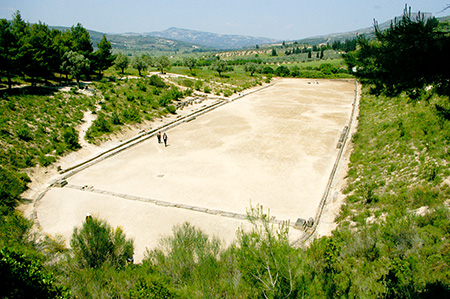 Imagine living at Highclere 2,000 years ago, battling through the challenges of growing food, of staying warm and simply surviving. Times were brutal and violent, political upheaval commonplace.
Then came the Romans, invading from the south and implementing wide scale changes to the political and social systems, to agriculture, building and lifestyles. They brought new rules but also new languages, new words and amazing stories and histories.
Imagine hearing travellers’ stories about what must have seemed to be the almost unbelievable wonders of another world, especially from the backdrop of a then very backward Britain.
Imagine living at Highclere 2,000 years ago, battling through the challenges of growing food, of staying warm and simply surviving. Times were brutal and violent, political upheaval commonplace.
Then came the Romans, invading from the south and implementing wide scale changes to the political and social systems, to agriculture, building and lifestyles. They brought new rules but also new languages, new words and amazing stories and histories.
Imagine hearing travellers’ stories about what must have seemed to be the almost unbelievable wonders of another world, especially from the backdrop of a then very backward Britain.
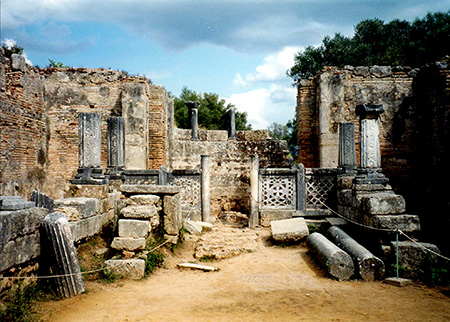 Such tales must have seemed beyond imagination or understanding. Architectural achievements of godlike proportions from the pyramids at Giza, to the lighthouse at Alexandria; the Gardens of Babylon, the Mausoleum at Halicarnassus, the Temple of Artemis and the great Statue of Zeus - the wonders of the ancient world although even then one of these had already disappeared - the Colossus of Rhodes - destroyed by an earthquake in c 280 BC.
All of these great buildings were, to an extent, a view of our links with the Gods, of a desire for some sort of lasting impression or immortality. Humans may be the only creature on this earth who contemplate death in advance and search for ways to overcome it.
Such tales must have seemed beyond imagination or understanding. Architectural achievements of godlike proportions from the pyramids at Giza, to the lighthouse at Alexandria; the Gardens of Babylon, the Mausoleum at Halicarnassus, the Temple of Artemis and the great Statue of Zeus - the wonders of the ancient world although even then one of these had already disappeared - the Colossus of Rhodes - destroyed by an earthquake in c 280 BC.
All of these great buildings were, to an extent, a view of our links with the Gods, of a desire for some sort of lasting impression or immortality. Humans may be the only creature on this earth who contemplate death in advance and search for ways to overcome it.
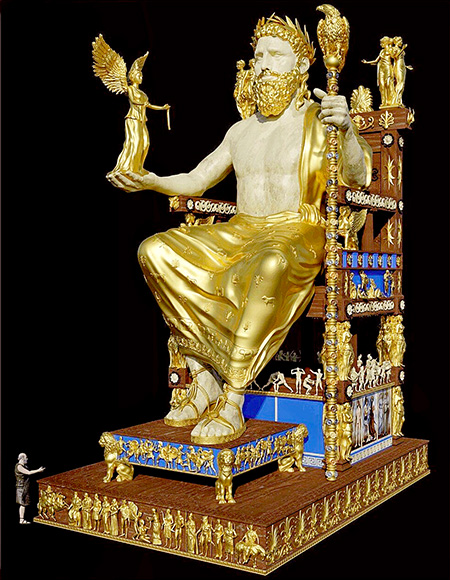 The immense statue of Zeus, King of the Greek Gods, stood at Olympia, having been commissioned by the custodians of the original Olympic Games. Over 40 foot high and made of gold, it showed the God seated and was the centrepiece of the newly constructed Temple of Zeus. The geographer Strabo noted early in the 1st century BC that the statue gave "the impression that if Zeus arose and stood erect he would unroof the temple." It was the masterpiece of Phidias, antiquity’s greatest sculptor and such was his skill that the magnetism of the scale and features made it instantly famous.
The painted cedar-wood throne was adorned with gold, precious stones, ebony and ivory, with painted figures and wrought images. The floor in front was paved with black tiles and surrounded by a raised rim of marble to contain a reservoir of perfumed oil which effectively acted as a reflecting pool, doubling the apparent height of the statue.
The Roman historian Livy commented that the Roman general Aemilius Paullus (the victor over Macedon) saw the statue and "was moved to his soul, as if he had seen the god in person".
The immense statue of Zeus, King of the Greek Gods, stood at Olympia, having been commissioned by the custodians of the original Olympic Games. Over 40 foot high and made of gold, it showed the God seated and was the centrepiece of the newly constructed Temple of Zeus. The geographer Strabo noted early in the 1st century BC that the statue gave "the impression that if Zeus arose and stood erect he would unroof the temple." It was the masterpiece of Phidias, antiquity’s greatest sculptor and such was his skill that the magnetism of the scale and features made it instantly famous.
The painted cedar-wood throne was adorned with gold, precious stones, ebony and ivory, with painted figures and wrought images. The floor in front was paved with black tiles and surrounded by a raised rim of marble to contain a reservoir of perfumed oil which effectively acted as a reflecting pool, doubling the apparent height of the statue.
The Roman historian Livy commented that the Roman general Aemilius Paullus (the victor over Macedon) saw the statue and "was moved to his soul, as if he had seen the god in person".
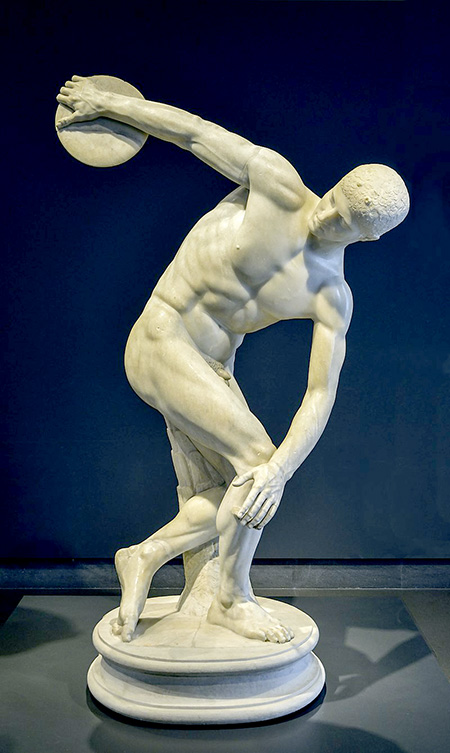 Every four years, for a thousand years beginning in 776 BC, people from all over the Greek-speaking world travelled to the site of Olympia to celebrate the ancient Olympic Games. Athletes representing city-states across Greece and its colonies would compete in sports from running, to pentathlons, discus, boxing and chariot racing. Those who succeeded in this ultimate test of physical prowess would be treated as local heroes for centuries to come.
Zeus’s statue was created about 435 BC and survived for nearly 1000 years when it was disassembled and rebuilt in Constantinople where it was later destroyed in a fire. Likewise the Olympic Games disappeared with the fall of the Greek Empire until they were revived in the late 19th century through the efforts of an Englishman, a Frenchman and a Greek.
Every four years, for a thousand years beginning in 776 BC, people from all over the Greek-speaking world travelled to the site of Olympia to celebrate the ancient Olympic Games. Athletes representing city-states across Greece and its colonies would compete in sports from running, to pentathlons, discus, boxing and chariot racing. Those who succeeded in this ultimate test of physical prowess would be treated as local heroes for centuries to come.
Zeus’s statue was created about 435 BC and survived for nearly 1000 years when it was disassembled and rebuilt in Constantinople where it was later destroyed in a fire. Likewise the Olympic Games disappeared with the fall of the Greek Empire until they were revived in the late 19th century through the efforts of an Englishman, a Frenchman and a Greek.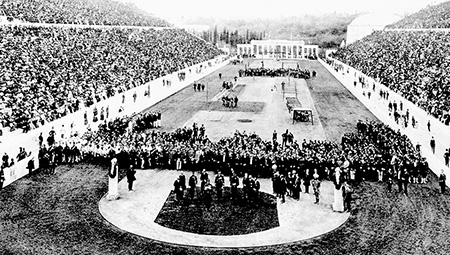 Baron Pierre de Coubertin was inspired to create the International Olympic Committee building on the ideas and work of an Englishman, William Brookes, who, in the 1860’s, had created a National Olympian Association to encourage local sporting competitions in cities across Britain.
Baron Pierre de Coubertin was inspired to create the International Olympic Committee building on the ideas and work of an Englishman, William Brookes, who, in the 1860’s, had created a National Olympian Association to encourage local sporting competitions in cities across Britain. 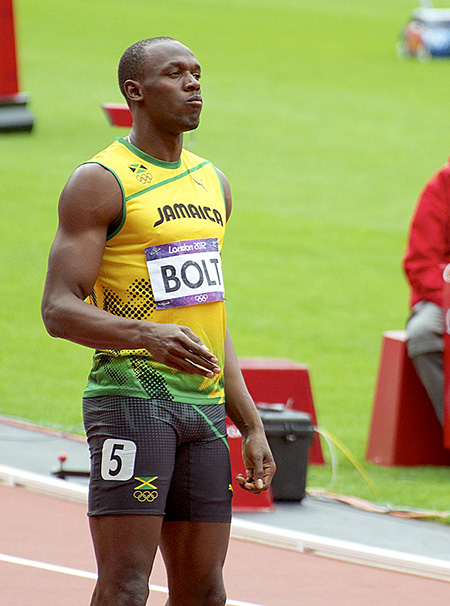 Coubertin was a romantic who admired the focus on sport on the playing fields of the English schools he visited and saw how "organised sport can create moral and social strength". A Greek family, the Zappas, then restored a stadium in Greece as a location for the new games which, as of old, would once again take place every four years.
The first of these new Olympic Games took place in Athens in 1896 and featured 280 participants from 12 nations, competing in 43 events. Since then, of course, the Olympic Games have become the world’s preeminent sporting competition.
Coubertin was a romantic who admired the focus on sport on the playing fields of the English schools he visited and saw how "organised sport can create moral and social strength". A Greek family, the Zappas, then restored a stadium in Greece as a location for the new games which, as of old, would once again take place every four years.
The first of these new Olympic Games took place in Athens in 1896 and featured 280 participants from 12 nations, competing in 43 events. Since then, of course, the Olympic Games have become the world’s preeminent sporting competition.
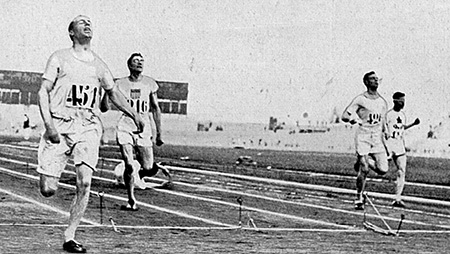 Coubertin’s motto for the Games was “Citius, Altius, Fortius” - “Faster, Higher, Stronger”. In 2021 a fourth word was added to the motto – “Communiter” - “Together”. It was Coubertin who said that the most important thing in the Olympic Games was not to win but to take part, just as the most important thing in life is not the triumph but the struggle. The essential thing is not to have conquered but to have fought well.
Two thousand years later, the world of the ancient Greeks still permeates so much of our own. Look again, for example, at the statue of George Washington, also known as Enthroned Washington. It is a large marble sculpture by Horatio Greenborough based on the statue of Zeus at Olympia.
Coubertin’s motto for the Games was “Citius, Altius, Fortius” - “Faster, Higher, Stronger”. In 2021 a fourth word was added to the motto – “Communiter” - “Together”. It was Coubertin who said that the most important thing in the Olympic Games was not to win but to take part, just as the most important thing in life is not the triumph but the struggle. The essential thing is not to have conquered but to have fought well.
Two thousand years later, the world of the ancient Greeks still permeates so much of our own. Look again, for example, at the statue of George Washington, also known as Enthroned Washington. It is a large marble sculpture by Horatio Greenborough based on the statue of Zeus at Olympia.
30 Comments
GOOD READ .
I love that photo of Eric Liddell with his face turned up to the heavens and running for the Glory of God.
It is a wonderful photo!
Yes a Wonderful Photo Eric Liddell is one of my Hero's
Lady Carnarvon, you are so full of knowledge. It must take forever to research all of this. Beyond interesting. Thank you. Cheryl.
Lovely the pictures of the Olympic did you and lord Carnarvon have a nice weekend and I am fan Downton Abbey and highcelere castle
I love the Olympics! But I don't think I will ever compete there. It would be quite lovely if Highclere could host the equestrian event when the Olympics goes to the U.K. The grounds of your place feel like a fairytale! Good job on preservation!!
Wonderful article Lady Carnarvon. Thank you
Lady Carnarvon,
Wonderful article on the history of the Olympics. This year's opening event was touching and extraordinary. Especially with all the wars going on. It brought the world closer. Ending with Celine's Hymn of Love.
I beautiful cover of history of the Olympics! Thanks!
Excellent history for today, thank you! Hope the younger generations are aware of the background for what is going on in Paris these next few weeks.
Maravilloso artículo.. muchas gracias Lady Carnarvon por compartirlo.. saludos cordiales desde Buenos Aires Argentina
Thank you so much for an excellent read!!
Lady Carnarvon,
I had the privilege to visit Olympia last year in October 2023. We backpacked to Europe, and Greece was our third country to visit. Standing where so many pushed them selfs to honor Zeus, was amazing. If I had a time machine I would love to see things in their eyes (excluding war and killings). Lady Carnarvon, thank you!
Have a blessed day,
Lilly
Hesperia, California
Great read & wonderful photos!
I loved the opening ceremony of the Olympics in Paris!
Thank you & Enjoy you week.
Lady Carnarvon,
I always look forward to Monday morning and your stories. This morning inspired me to find out more about Greenough’s sculpture of George Washington. Your research is exemplary - that thousands of years ago our ancestors found a way to excel in their athletic gifts from their gods. Many of your columns are saved for my grandchildren! Thank you!
Martha G
Good time of the day Lady Carnarvon,
Excellent article and reminded me our trip to Greece, visiting Olympia and running the full Olympian stadia on the very Olympic Stadium where ancient Games took place...
Also there is Phydias's workshop and other amazing artifacts on that spot.
Greetings from California,
Alex and Julia Sakowski
Thank you so much for that very interesting history of the Olympics! I learned a lot.......had never heard of the Enthroned Washington statue, so I've googled that and learned a bit more! I enjoy your blog so much!
Excellent read thank you ,
Yes, thank u.
Dear Lady Carnarvon,
Thanks for sharing. I am impressed by how the text establishes a link between imagination; the ideas of life at Highclere 2,000 years ago and the ideas of evolution of the Olympic Games, seeking to illustrate the impact of history, culture, and the continuity of certain traditions on humanity that are worthy of admiration and study.
Kind Regards,
Simón Sánchez, Caracas – Venezuela.
Thank you
My dearested Lady Fiona,
Texto magnífico, que resumo impressionante milady fez.
Magistral, Bravo,bravo!!!!!!!
Impressionante...
Thank very much.
Thank you for the thorough history lesson. I, at 86, learned SO much and appreciate your hard work.
Carol from Redding CA
You are so kind!
Very interesting and informative article! Thanks for sharing!
First, when you mentioned that an Englishman was involved in reviving the Olympic Games, I expected to read in the next sentences it was an Earl Carnavon. Though it was not, it would have suited this extraordinary family.
Dear Lady Carnarvon:
Thank you for this Monday's blog and the brief, but fascinating history of the Greek and present day Olympics.
The only segment of the Opening Ceremony I watched was Celine Dion's beautiful performance on the Eiffel Tower. Otherwise, I did not watch any other events; just waited for the local news and end results.
Until next time, I wish you well.
Perpetua Crawford
Leave a Comment

- Christmas
- Community
- Dogs & Horses
- Egypt & Tutankhamun
- Entertaining
- Farm
- Filming
- Gardens
- History & Heritage
- Daily Life
- Royalty
- Cooking
- Interiors
- Heroes
- Architecture
- Cars
- Conservation
- Downton Abbey
- Events
- Gardens & Landscape
- Highclere Castle Gin
- History
- Planes
- Restoration
- Stories & Books
- Uncategorized
- Visitors
- Wildlife





Good Afternoon Lady Carnarvon,
Thank you for this fascinating read. I both learned from and was inspired by your words, as is usually the case each Monday.
Best wishes from Arizona,
Lynne Froehlich
Many thanks
Very interesting and informative article! Thanks for sharing!
First, when you mentioned that an Englishman was involved in reviving the Olympic Games, I expected to read in the next sentences it was a Earl Carnavon. Though it was not, it would have suited this extraordinary family.